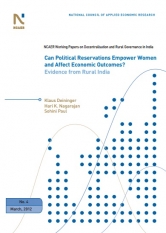Can Political Reservations Empower Women and Affect Economic Outcomes? Evidence from Rural India
Sohini Paul
Hari K. Nagarajan
Klaus Deininger
March 2012
While many studies explored impacts of political quotas for females on public goods provision, knowledge on immediate and longer term economic impacts of such interventions remains limited which is undesirable in view of the widespread adoption of such policies. We use nation-wide data from India on current outcomes and a village’s reservation status for the entire period for which reservations had been in place to assess recurrent and longer-term impacts of this policy. Beyond recurrent impacts on public good delivery, we find evidence on persistent effects of reservation on voicing of concerns to local authorities if there are problems, the amount of time females spend on domestic duties and in the labour market, as well as their bargaining power regarding reproductive choices and control of finances within the household.
Human Development and Data Innovation






